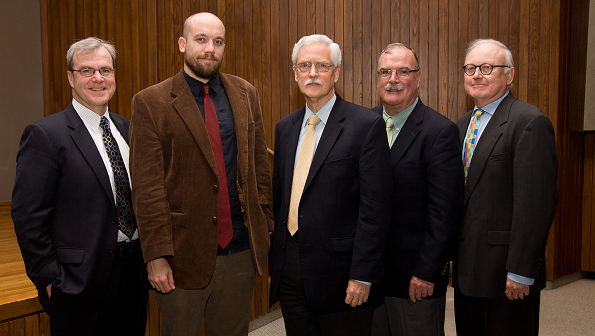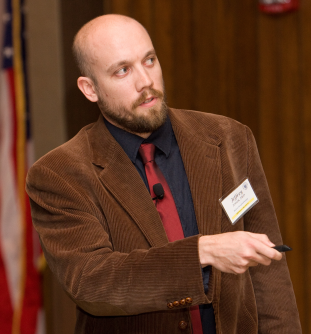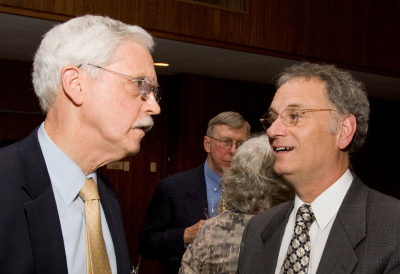 At the Hudson Hoagland Society annual meeting, from left: Provost and Executive Deputy Chancellor Terence R. Flotte, MD; Jeffrey Jensen, PhD; Robert H. Brown, DPhil, MD; Vice Provost for Research John Sullivan, MD; and Thoru Pederson, PhD. |
Telling an attentive and inquisitive audience that the most crucial ingredient for new discoveries in amyotrophic lateral sclerosis (ALS, or Lou Gehrig’s Disease) is collaboration between scientists in diverse fields, Robert H. Brown, DPhil, MD, chair and professor of neurology, spoke on the promise and progress of ALS research and treatments at the 26th annual meeting of the Hudson Hoagland Society on Wednesday, May 11, at the Hoagland-Pincus Conference Center in Shrewsbury.
Dr. Brown, renowned for his groundbreaking research on the genetic basis of neurodegenerative and neuromuscular diseases, was joined by Jeffrey Jensen, PhD, assistant professor of molecular medicine and a 2010 Worcester Foundation Grant recipient, who spoke about the population genetics of adaptation. Dr. Jensen was among a group of scientists to receive the 2010 Newcomb Cleveland Prize from the American Association for the Advancement of Science for sequencing the Neandertal genome, a scientific accomplishment considered as technically impressive as it is critical to understanding human evolution.

Jeffrey Jensen, PhD, assistant professor of molecular medicine, spoke about the population genetics of adaptation.
“We do a lot of really cool things,” said Jensen about colleagues in his lab and in the Program in Bioinformatics and Integrative Biology. “We’re able to apply technology to test theories, we do amazing computations, we work in a world with unprecedented amounts of data—often very messy data—that gives us the opportunity to test fundamental theories of evolutionary biology.”
Jensen’s talk on the excitement of sequencing the Neandertal genome and comparing it to the human genome was a perfect complement to Brown’s discussion of the painstaking detective work of hunting the genes connected to several different types of ALS.
“ALS gene defects are a part of the story, but they’re not the whole story,” Brown said. “We’re finding subtle abnormalities in RNA. Researchers are finding environmental impacts, including susceptibility to neurotoxins—these are all elements that suggest that there are multiple pathways that lead to ALS—that will need to be understood in order to treat, or cure.”

Robert H. Brown, DPhil, MD, (left) talks with Andrew Miller, MD ’79, at the Hudson Hoagland Society annual meeting.
Founded in 1985, the Hudson Hoagland Society continues to expand philanthropic support for scientific discovery and extraordinary advancements. Named in honor of the co-founder of the Worcester Foundation for Biomedical Research (which merged with UMMS in 1997), the Hudson Hoagland Society, through support of basic scientific research, enables UMMS scientists to make advances that have the potential to improve treatments and speed the discovery of new medicines for countless diseases and afflictions. Each year, Worcester Foundation “seed” grants are awarded to investigators for promising research projects in their early stages. To date, 129 grants totaling nearly $4 million have been awarded and, in a great majority of cases, use of these funds resulted in sufficient progress for the grantees to seek and win federal funding for their projects.
Thoru Pederson, PhD, the Vitold Arnett Professor of Cell Biology, professor of biochemistry & molecular pharmacology and the former scientific director of the Worcester Foundation, noted that Brown’s appearance had a special resonance for friends and benefactors of the Hudson Hoagland Society: Mort Sigel, longtime Worcester Foundation Board chair and Hudson Hoagland Society member, died from ALS.
This year’s meeting also included the presentation of the Hudson Hoagland Award to Robert A. Bernhard, one of the longest serving trustees of the Worcester Foundation, who provided the Foundation with guidance on strategic planning and research affiliations. A charter member of the Hudson Hoagland Society, Bernhard served as a Worcester Foundation trustee from 1971 until the merger with UMMS.